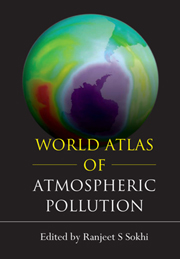Book contents
- Frontmatter
- Contents
- Contributors
- Foreword
- Preface
- Acknowledgements
- International Union of Air Pollution Prevention and Environmental Protection Associations (IUAPPA)
- Global Atmospheric Pollution (GAP) Forum
- Acronyms and Abbreviations
- Selected Units Used in Atmospheric Pollution Science
- INTRODUCTION
- CHAPTER 1 AIR POLLUTION HISTORY
- CHAPTER 2 AIR POLLUTION IN URBAN AREAS
- CHAPTER 3 LONG-RANGE TRANSPORT OF ATMOSPHERIC POLLUTANTS AND TRANSBOUNDARY POLLUTION
- CHAPTER 4 GLOBAL AIR POLLUTION AND CLIMATE CHANGE
- CHAPTER 5 OZONE DEPLETION
- CHAPTER 6 ENVIRONMENTAL AND HEALTH IMPACTS OF AIR POLLUTION
- CHAPTER 7 FUTURE TRENDS IN AIR POLLUTION
- References
- List of Useful Reading Material
- Index
CHAPTER 7 - FUTURE TRENDS IN AIR POLLUTION
Published online by Cambridge University Press: 05 March 2012
- Frontmatter
- Contents
- Contributors
- Foreword
- Preface
- Acknowledgements
- International Union of Air Pollution Prevention and Environmental Protection Associations (IUAPPA)
- Global Atmospheric Pollution (GAP) Forum
- Acronyms and Abbreviations
- Selected Units Used in Atmospheric Pollution Science
- INTRODUCTION
- CHAPTER 1 AIR POLLUTION HISTORY
- CHAPTER 2 AIR POLLUTION IN URBAN AREAS
- CHAPTER 3 LONG-RANGE TRANSPORT OF ATMOSPHERIC POLLUTANTS AND TRANSBOUNDARY POLLUTION
- CHAPTER 4 GLOBAL AIR POLLUTION AND CLIMATE CHANGE
- CHAPTER 5 OZONE DEPLETION
- CHAPTER 6 ENVIRONMENTAL AND HEALTH IMPACTS OF AIR POLLUTION
- CHAPTER 7 FUTURE TRENDS IN AIR POLLUTION
- References
- List of Useful Reading Material
- Index
Summary
‘Prediction is very difficult, especially if it's about the future’ (Niels Bohr, Nobel laureate in Physics). For instance, forecasters in Victorian London foresaw their city knee-deep in horse manure, one of the most pertinent urban environmental problems in cities at that time. A hundred years later, this prediction has not materialized and the situation has changed drastically. While traffic itself is still considered a major cause of urban air pollution, the contribution from horses has entirely disappeared and motorized vehicles are now the major source of deteriorated air quality in most modern cities.
Given the failure of simple extrapolations of present trends into the future, what can we say about air pollution in the coming decades?
To begin with, we know that population will further increase in urban areas, and we know that all societies aim to further strengthen their economic wealth. For a long time, air pollution from anthropogenic (non-natural) activities has been considered an unavoidable concomitant of economic development. Over long historic periods, we have seen air pollution levels increasing together with economic growth. Countermeasures to control air pollution have often been considered too costly to put into effect without compromising economic wealth.
Following this logic, the envisaged continued growth in global population, together with the universal target of improving prosperity, would lead to drastically worsened air quality around the globe, especially in many developing countries.
- Type
- Chapter
- Information
- World Atlas of Atmospheric Pollution , pp. 95 - 102Publisher: Anthem PressPrint publication year: 2008



